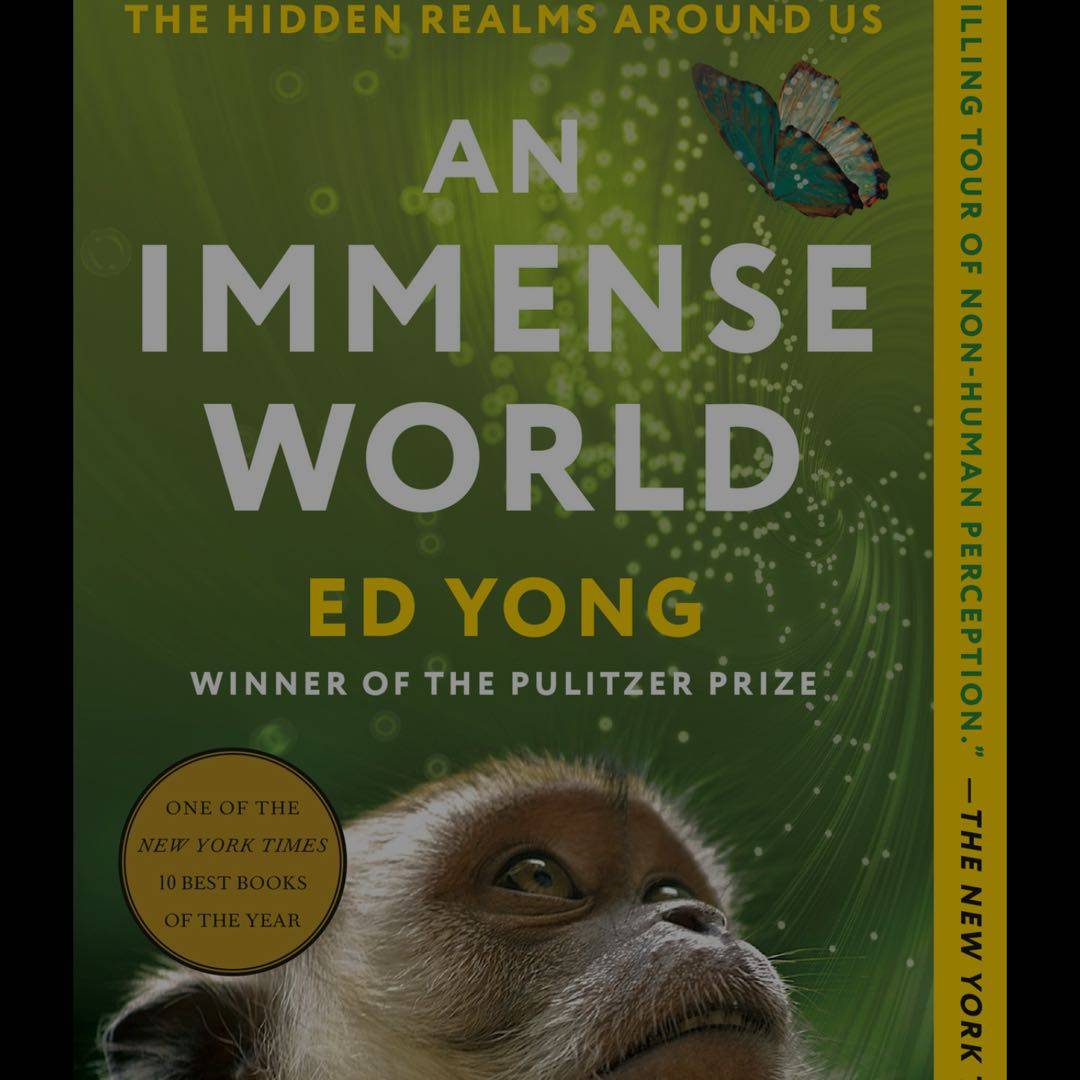
This is a dense dive into other animal‘s senses and the near impossibility that human animals will ever truly be able to know what it‘s like to be another animal. ⭐️⭐️⭐️⭐️⭐️

This is a dense dive into other animal‘s senses and the near impossibility that human animals will ever truly be able to know what it‘s like to be another animal. ⭐️⭐️⭐️⭐️⭐️
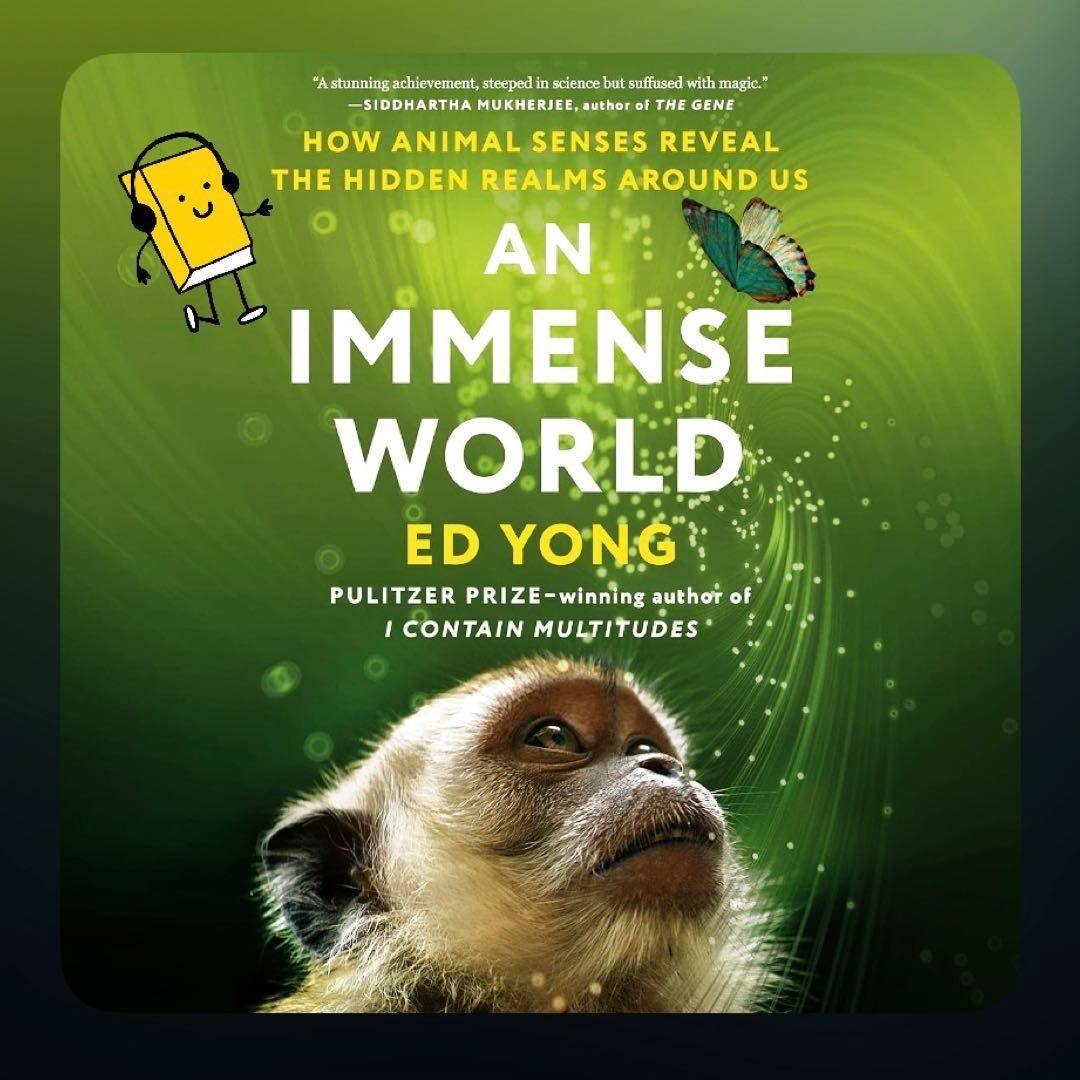
This was my most recent buddy read with my mom, and we both enjoyed it…um, immensely 🙄 So well presented and delightful! Lots of science-y terms and some details my addled brain will never retain, but overall a fascinating and humbling presentation of the senses in the living world. Mom and I are still bringing up things we notice and appreciate in our own backyards! What a gift, this expansion to our awareness. Fantastic! ⭐️⭐️⭐️⭐️⭐️
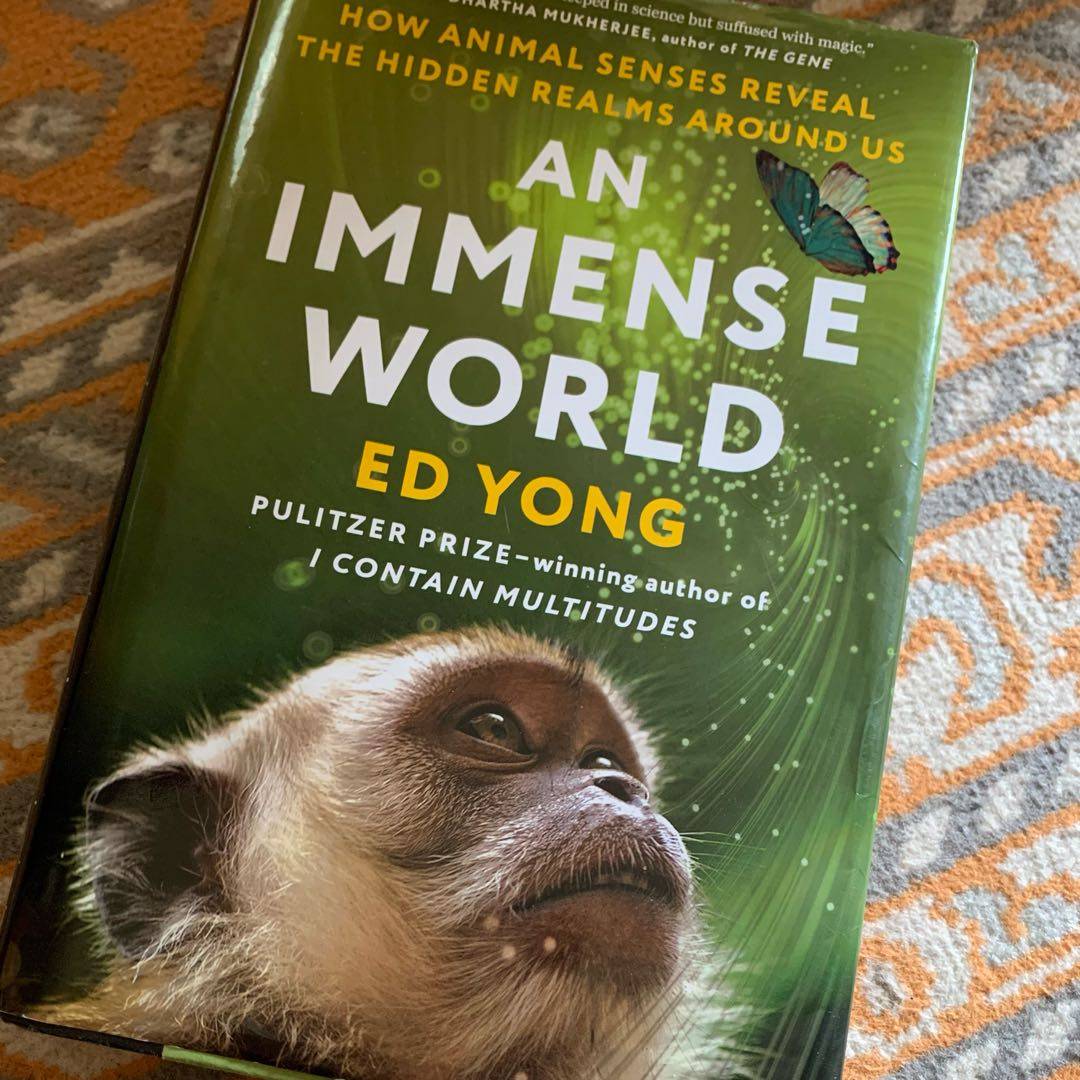
I loved everything about this book. Ed Yong is a supreme science writer, making the complex understandable and doing it with wonderful but not overpowering sense of humor. I learned so much from this book, but even more it was one of those extremely rare books that changed the way I view the world.
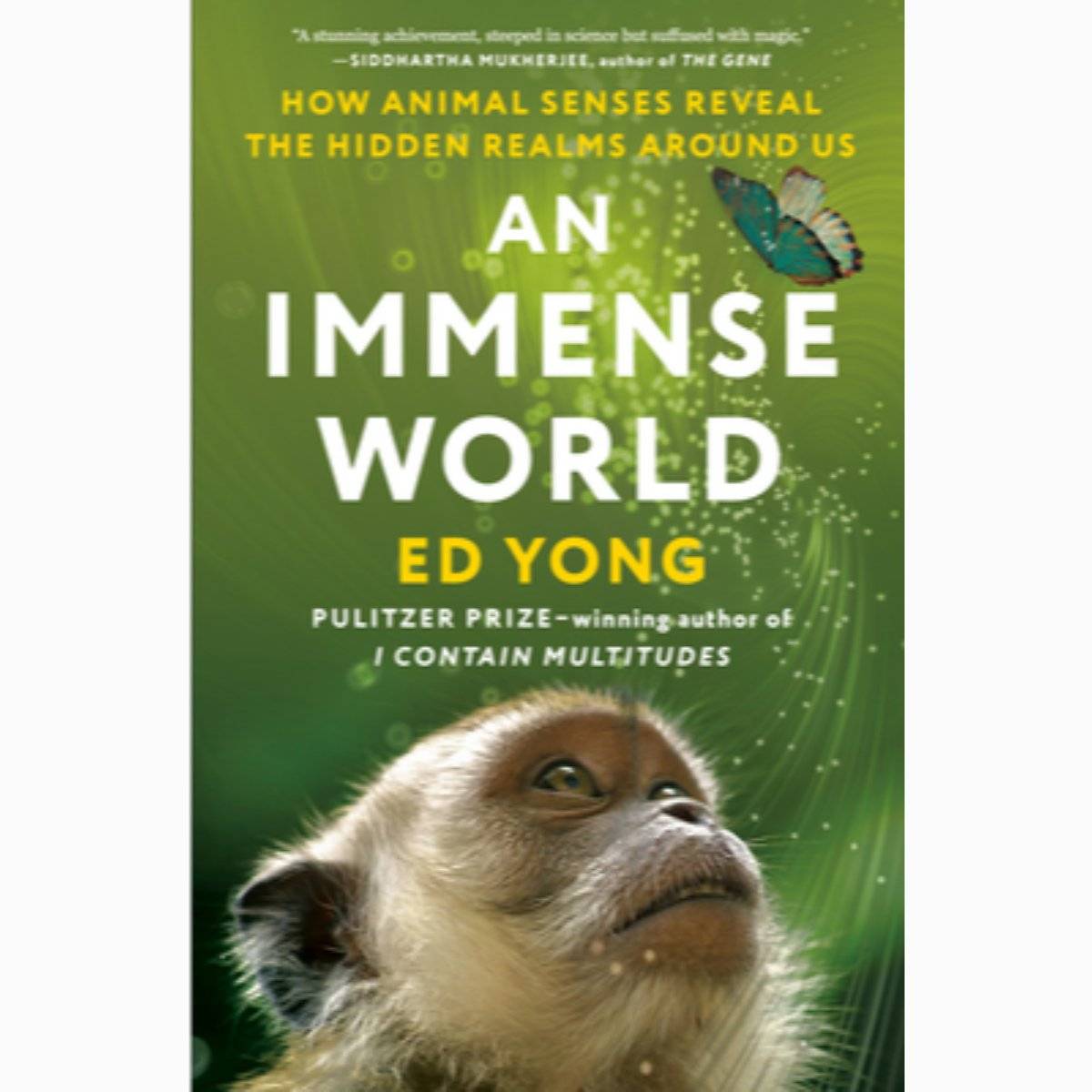
This is a fascinating look at how animals perceive the world around them, using senses. Some of these are those we share as humans, but many are specific to some animal groups, such as echolocation and sensing magnetic fields. While it is a science book, the author's sense of humour comes through and lightens the overall feel of the book. While I won't remember all the details, my respect for the diversity of life has grown immensely. 4/5 stars!
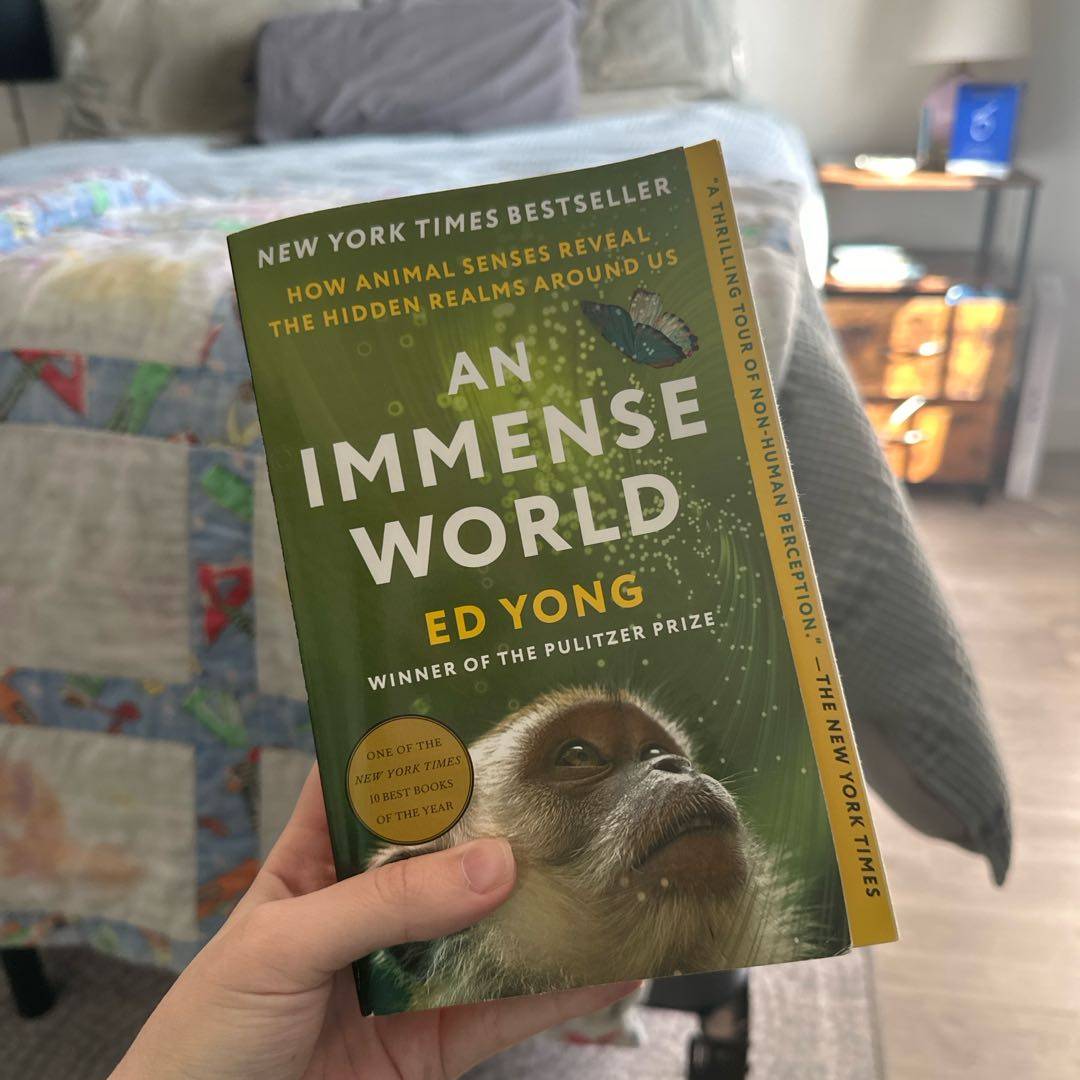
Ed Yong takes us into the different sensory worlds of animals and humans, and draws connectedness even when experiences are clearly different.
Umwelt ✨ Scientific ✨ Stimuli
Sometimes I need a good non fiction book to help reset my reading slump, and this one was actually well written despite how dense it was. That said, even comedic lines and simplified biology explanations, can‘t keep my focus 100% of the time.
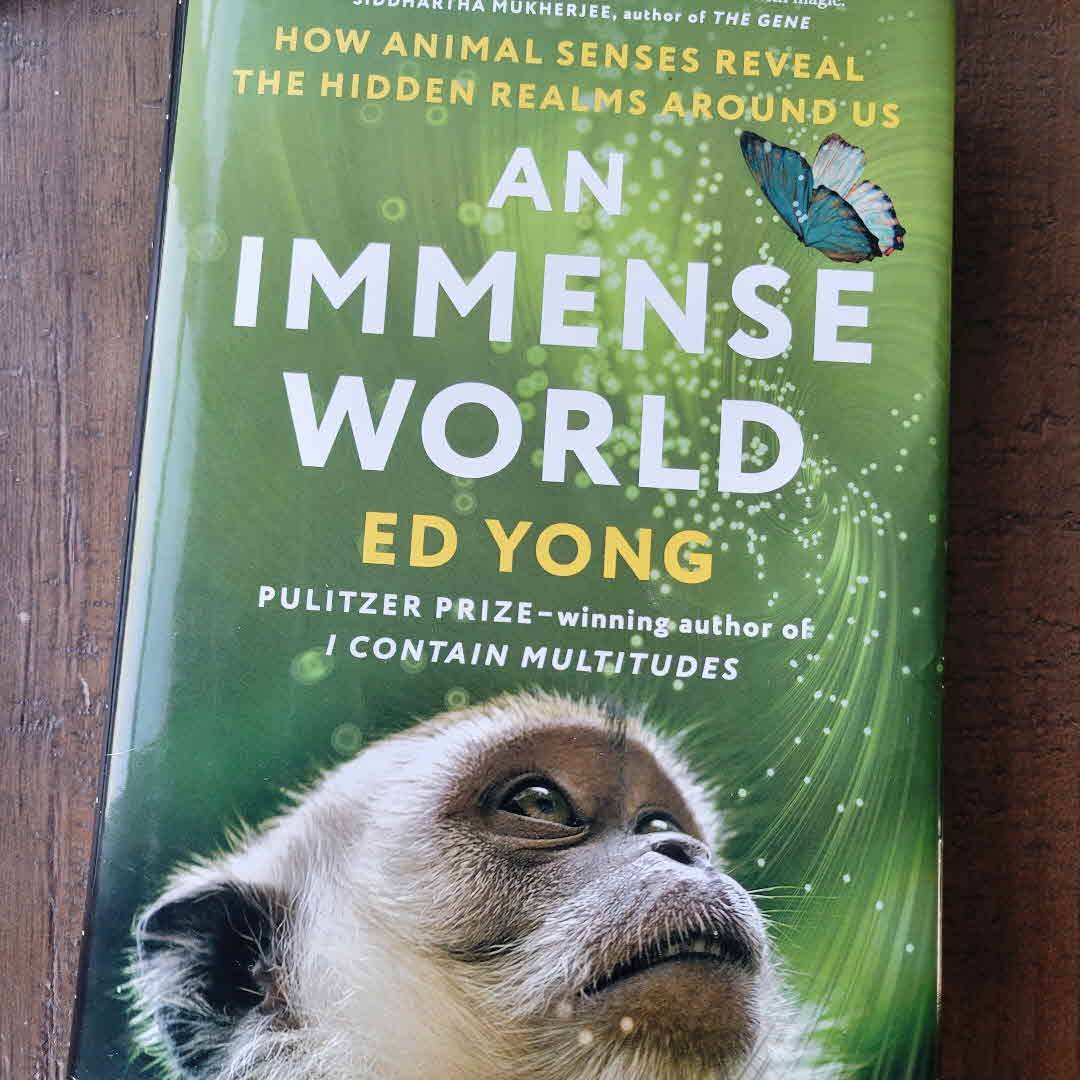
What an extraordinary book! I absolutely loved this fascinating deep dive into the world of animal perceptions. How amazing it must be to see in shades of ultraviolet, to sense the electric fields of flowers, to use an internal magnetic compass to find your way, to sense vibrations in the earth--it is humbling and awe-inspiring to glimpse the scope of what we don't understand and to imagine what it's like to perceive the world in unexpected ways.
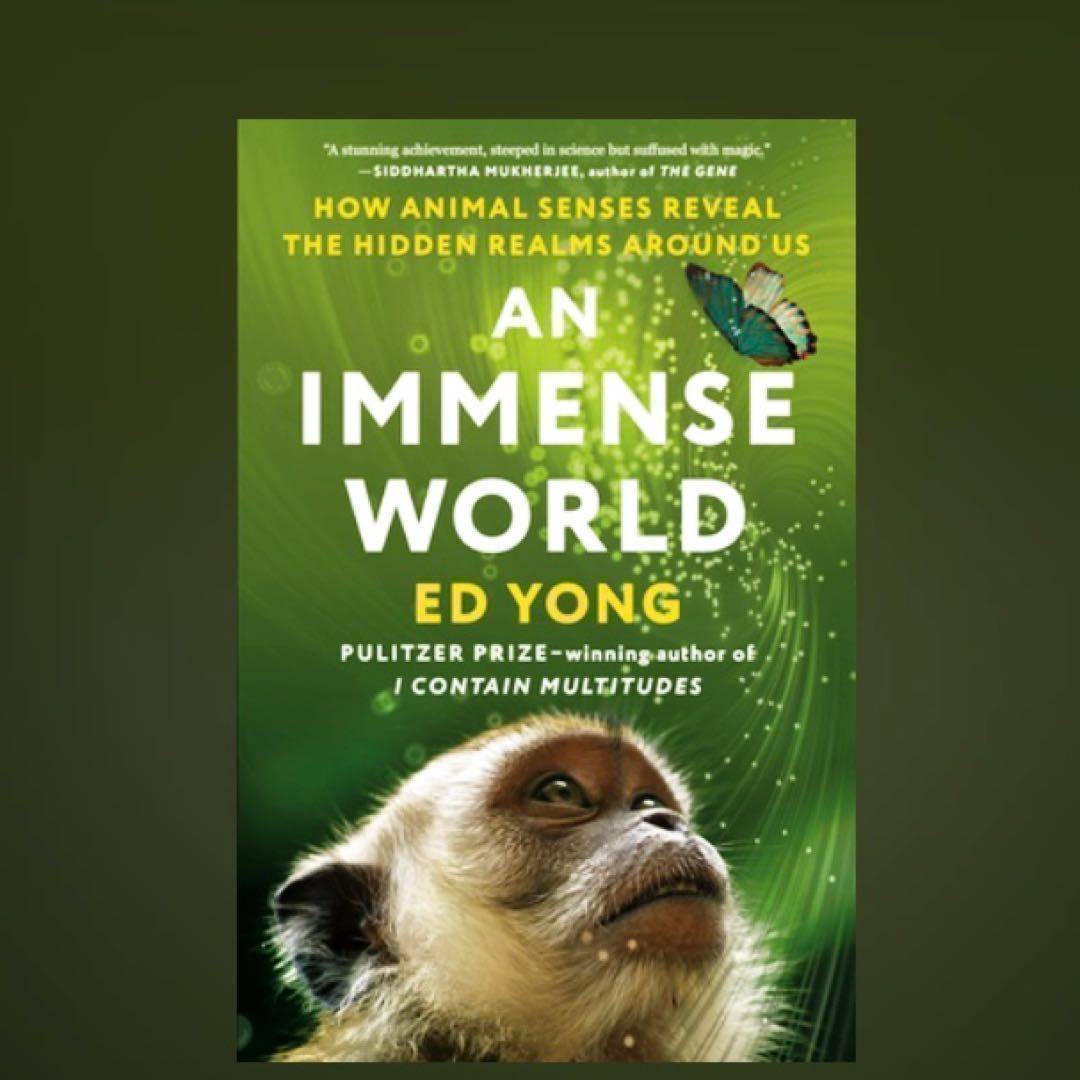
Yong takes us on a journey of animal sensory perception by explaining the ways they live in a different world, informed by their own unique bodies. I won‘t remember all of the facts (this would make a good reference book) but I will remember some of the highlights that stuck out to me and the overall way Yong helped me to reimagine life from these radically different perspectives.
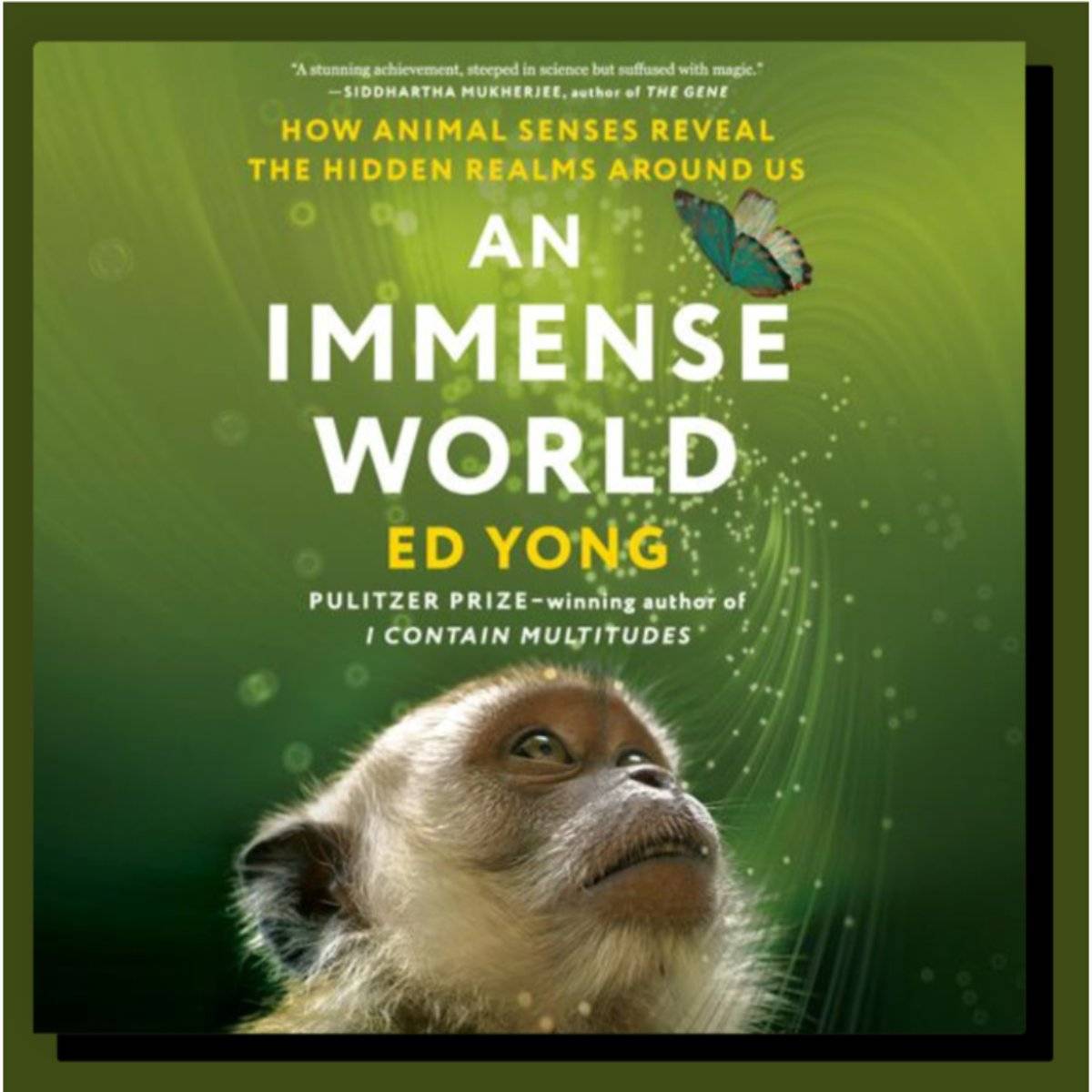
Lots of nifty animal facts to know and tell!
I appreciate the emphasis on the alien nature of looking at another creature's senses and the mistake of attempting an anthropocentric value judgement or analogy. We're often just figuring out how they work, and the idea that we can comprehend them and rank them is...unwise. 1/?
“Nature documentaries get this wrong when they try to show what rattlesnakes see by filming the world with thermal cameras. Those images .... always unrealistically detailed. Predator, the 1987 movie in which Arnold Schwarzenegger encounters a trophy hunting alien did a better job of depicting the blurriness of infrared vision. This is perhaps the only time that anyone has accused Predator of being realistic.“ 😆
“... the animal in the tank has a reputation and I'm nervous about testing it. “How hard is the hit?“ I ask.
“It's enough to surprise you,“ Street says.
Do it.
I stick my pinky into the water, almost instantly there is a flash of green, as a two inch long animal darts out and attacks me. There's a loud click, and a sharp, but tolerable pain in my finger. I feel strangely proud to have taken a punch from a purple spot mantis shrimp.“
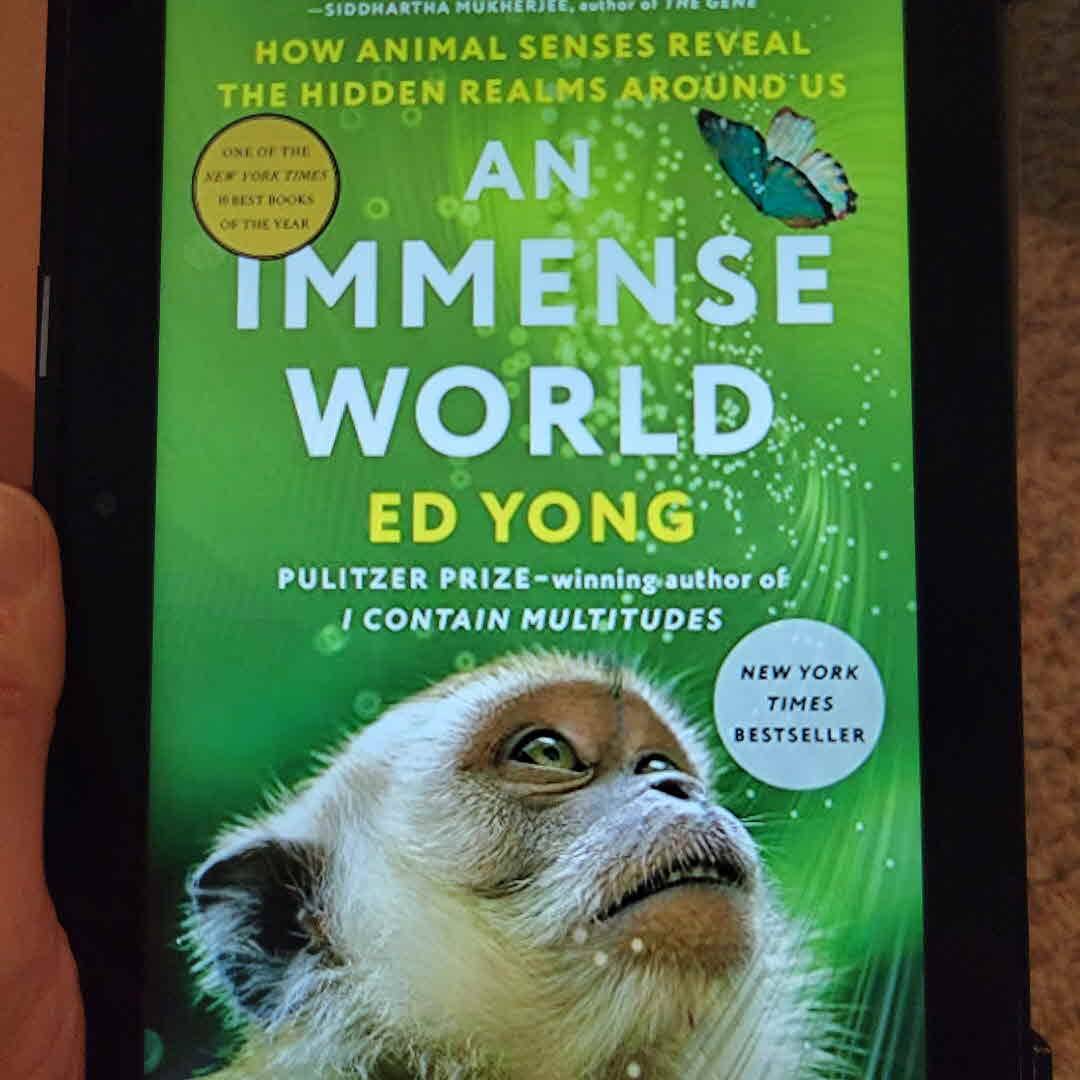
Very interesting and a bit too detailed for my brain at times.
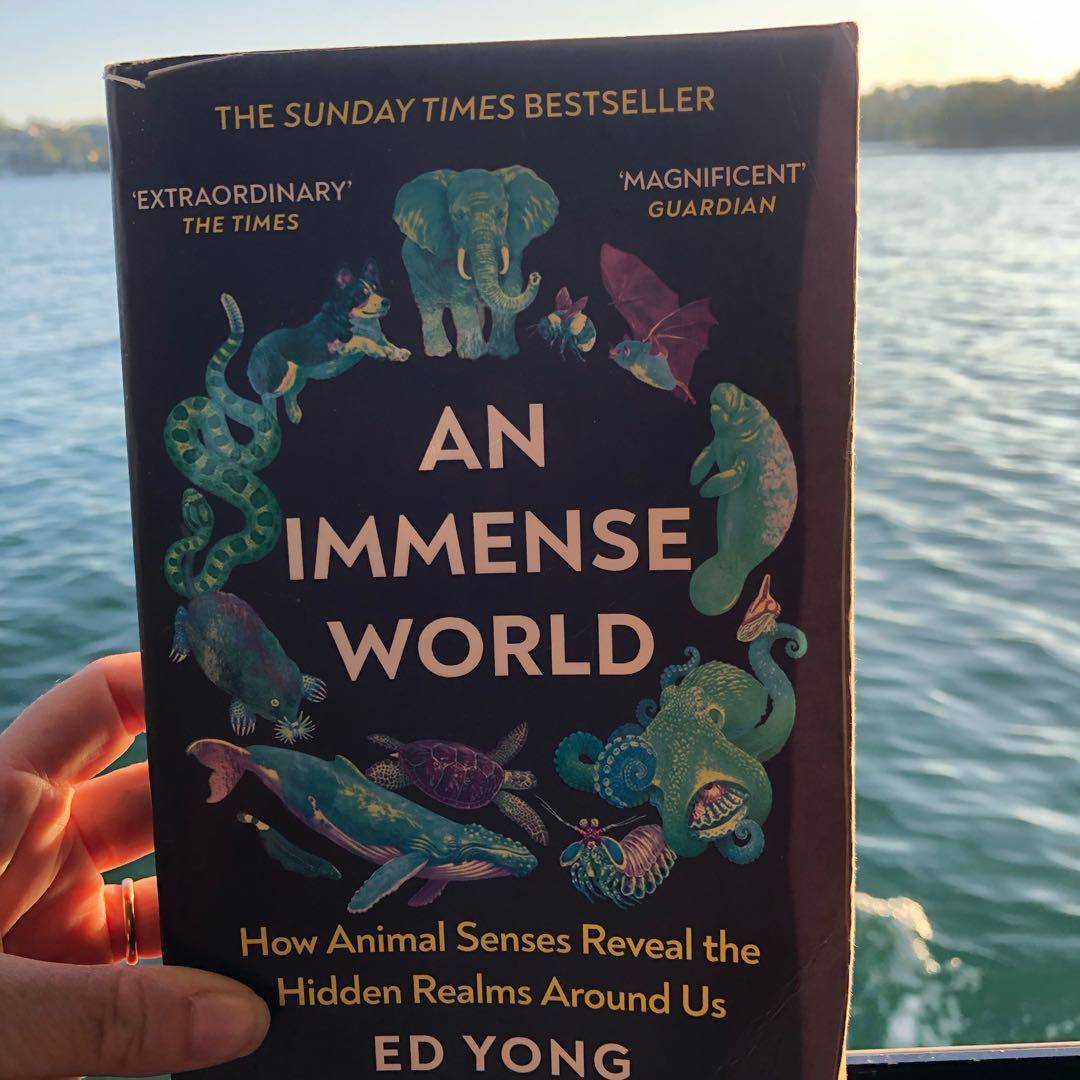
Freaking fascinating. I loved every moment of this book. Highly recommend
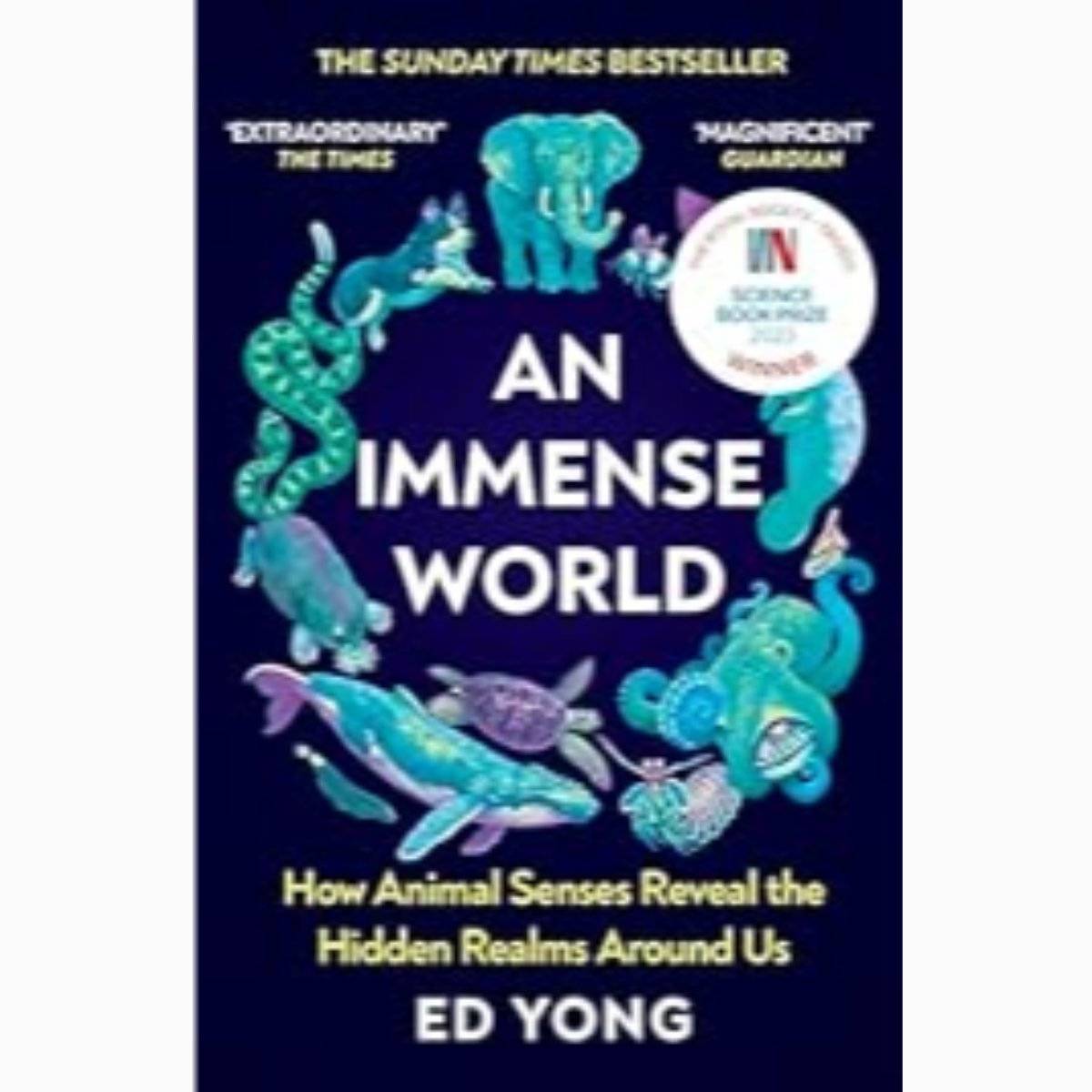
Different animals perceive and experience the world differently due to their different senses. It is difficult and necessary to overcome the biases from how WE perceive the world if we want to really understand other animals. For example, a zebra's stripes are not camouflage because from a distance all a lion can see is a zebra-shaped object and the stripes have no effect on that.
Fascinating.

Apparently it's called a spoiler. The things you learn from books about animals. But do people worry about spoiler spoilers when waiting for a new car design to be released?
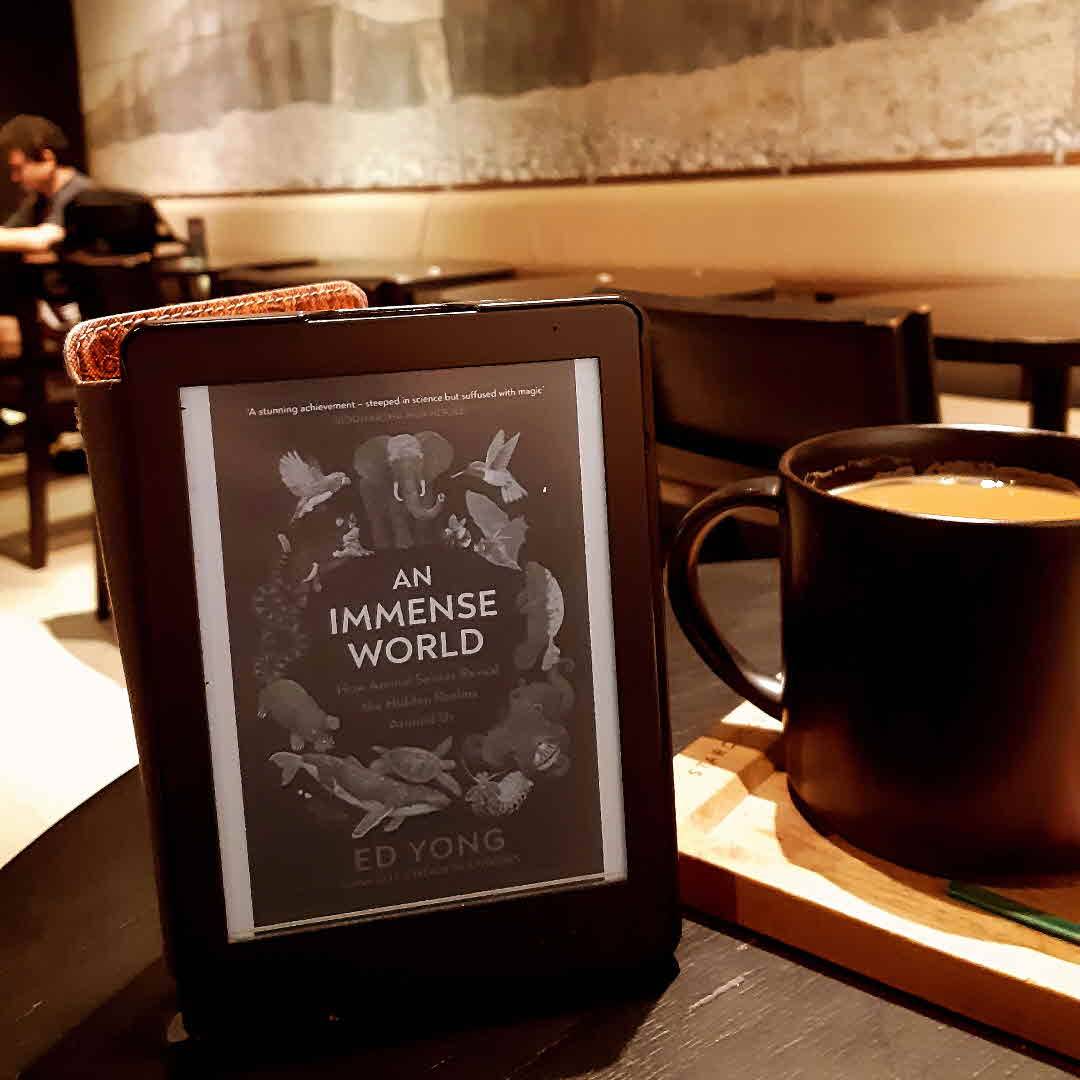
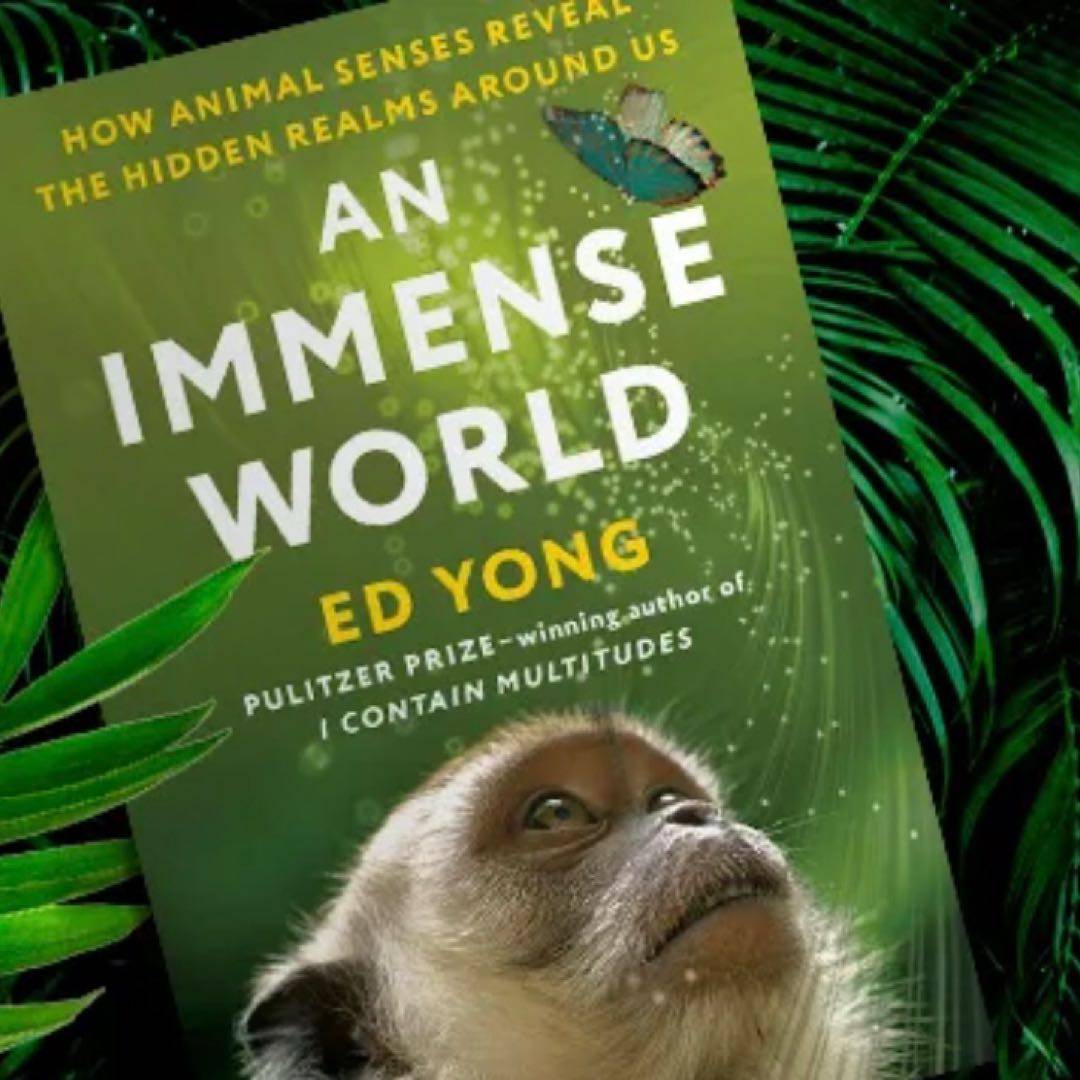
#12Booksof2023 December
This book full of fun stuff about different animals and how they see the world
I also have an honorable mention this month:
Paris the Memoir by Paris Hilton. A reminder that no one is what they seem
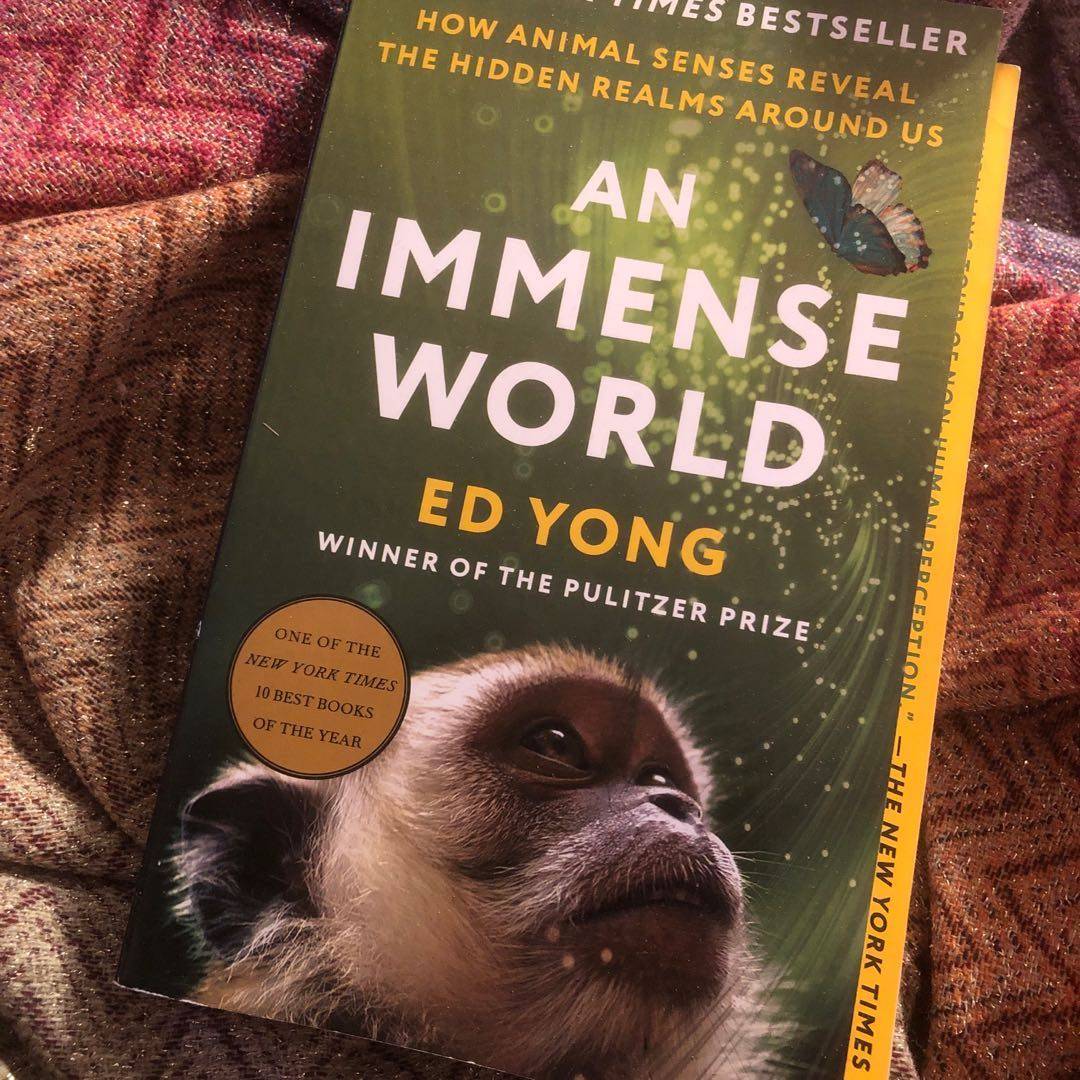
Amazing 🤩
During the pandemic I started going on works in the forest and I got a appreciation for the trees, birds, butterflies and other animals.
That is what was so great about this book that in order to understand to world of other animals, Yong find research on animals we‘re already familiar with like dogs, birds, butterflies, octopus and whales and more.
And it‘s so interesting to learn more about the world of other animals and try

I had the good fortune to hear Ed Yong speak last week. He says, “All of my work is about curiosity and empathy. It‘s about trying to take the perspective of lives that are very different from ours on the grounds that those lives are worth understanding and knowing, and that our lives are richer for making the effort.” His work is a generous, wonderful gift to us all. (Photo credit: Friends of the Hennepin County Library.)
Perhaps people who experience the world in ways that are considered atypical have an intuitive feeling for the limits of typicality.
Our species and our culture are so driven by sight that even people who are blind from birth will describe the world using visual words and metaphors.
I want to know what it is like for a bat to be a bat,” Nagel wrote. “Yet if I try to imagine this, I am restricted to the resources of my own mind, and those resources are inadequate to the task.
How many senses are there? Around 2,370 years ago, Aristotle wrote that there are five, in both humans and other animals—sight, hearing, smell, taste, and touch. This tally persists today. But according to the philosopher Fiona Macpherson, there are reasons to doubt it.
The senses constrain an animal‘s life, restricting what it can detect and do. But they also define a species‘ future, and the evolutionary possibilities ahead of it.
Light is just electromagnetic radiation.Sound is just waves of pressure.Smells are just small molecules.It‘s not obvious that we should be able to detect any of those things,let alone convert them into electrical signals or derive from those signals the spectacle of a sunrise,or the sound of a voice,or the scent of baking bread.The senses transform the coursing chaos of the world into perceptions and experiences things we can react to and act upon
They are not brethren, they are not underlings; they are other nations, caught with ourselves in the net of life and time, fellow prisoners of the splendour and travail of the earth.
They move finished and complete, gifted with extensions of the senses we have lost or never attained, living by voices we shall never hear.
There are animals with eyes on their genitals, ears on their knees, noses on their limbs, and tongues all over their skin.
There are animals that can hear sounds in what seems to us like perfect silence, see colors in what looks to us like total darkness, and sense vibrations in what feels to us like complete stillness
It is all that we know, and so we easily mistake it for all there is to know. This is an illusion, and one that every animal shares.
Trees of green, red roses too, skies of blue, and clouds of white—these are not part of its wonderful world. The tick doesn‘t willfully ignore them. It simply cannot sense them and doesn‘t know they exist.
Earth teems with sights and textures, sounds and vibrations, smells and tastes, electric and magnetic fields. But every animal can only tap into a small fraction of reality‘s fullness. Each is enclosed within its own unique sensory bubble, perceiving but a tiny sliver of an immense world
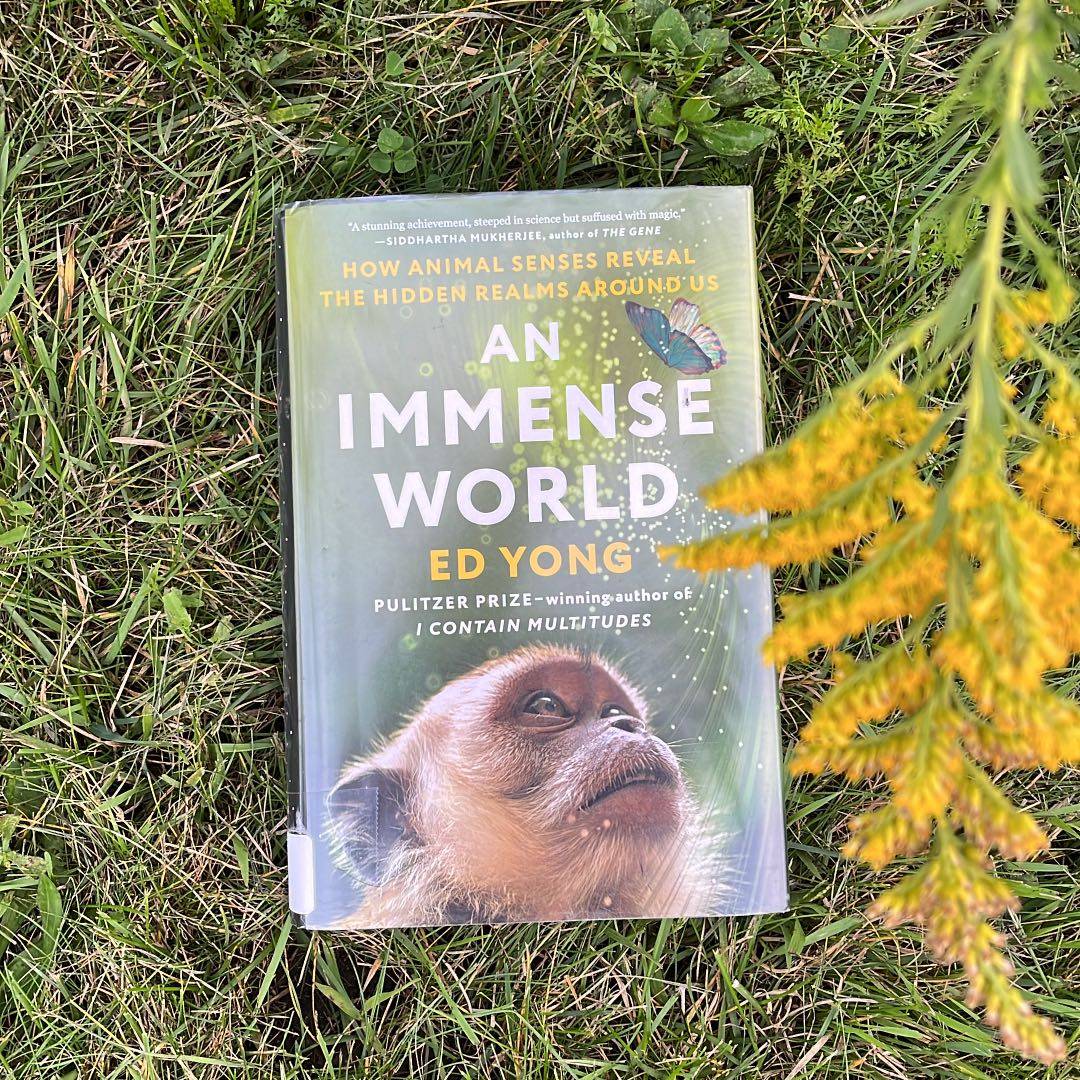
This is packed with facts about how different animals use the five senses. While having a lot of information the prose is very accessible and not overly scientific.
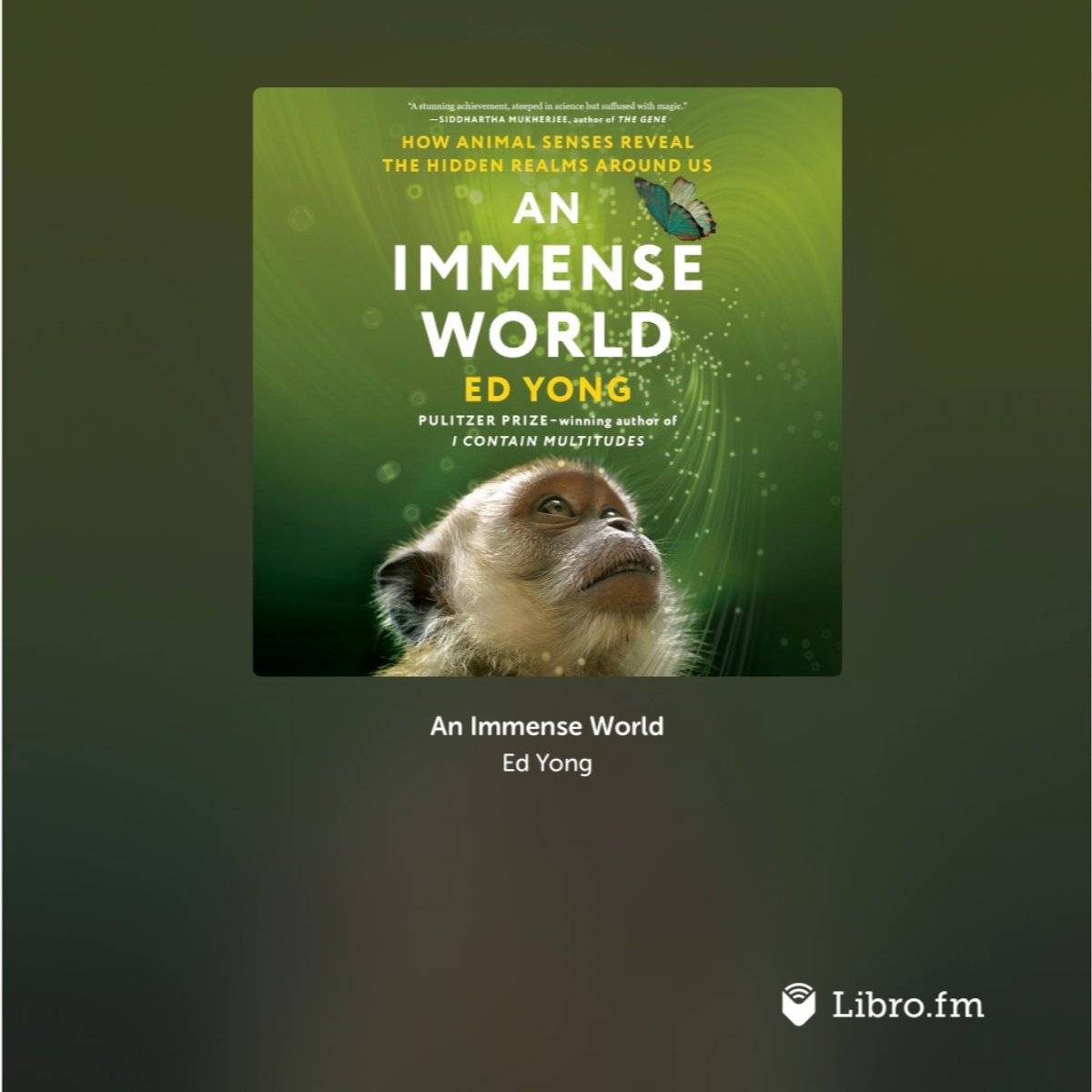
I am 36% into this book.
Everyone should read this. This isn't just a “pick“ this is an “I'M SHOUTING AT YOU RIGHT NOW TO READ THIS.“
Ed Yong is so passionate and his narration is so humorous and deeply thoughtful. My whole world perception has been challenged and changed without feeling overwhelmed. It's beautiful.
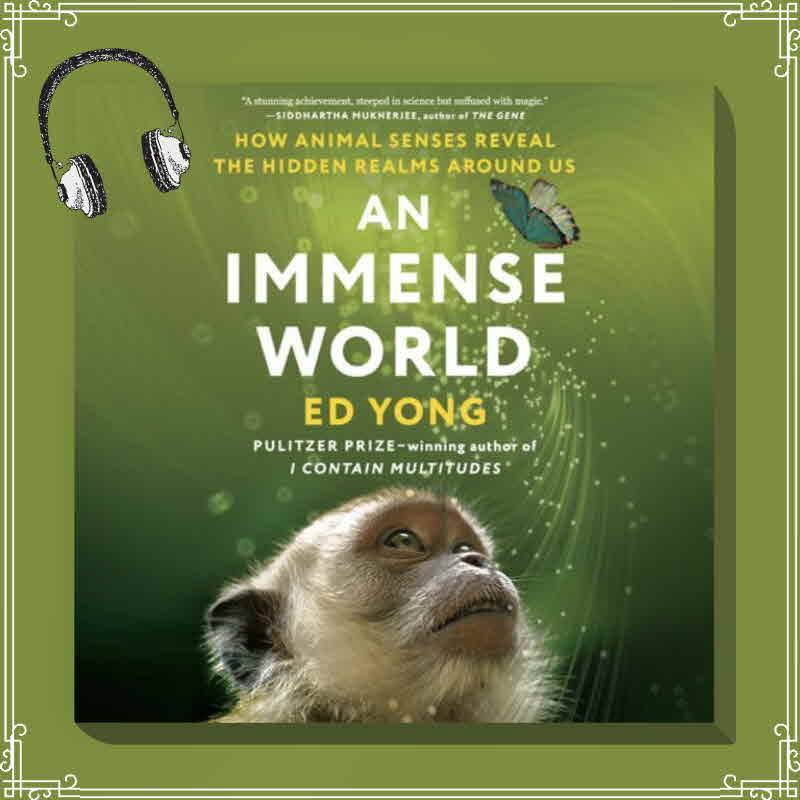
I absolutely loved this. This book explains the umwelt concept -- which basically supposes that we can't imagine the experience of other animals because we can't know their sensory world. Essentially we would need to know everything about another animal to understand how they perceive their environment and we don't even know what organs that animals use for magnetoreception, etc. I really enjoyed learning more about some of my favorite animals ⬇️
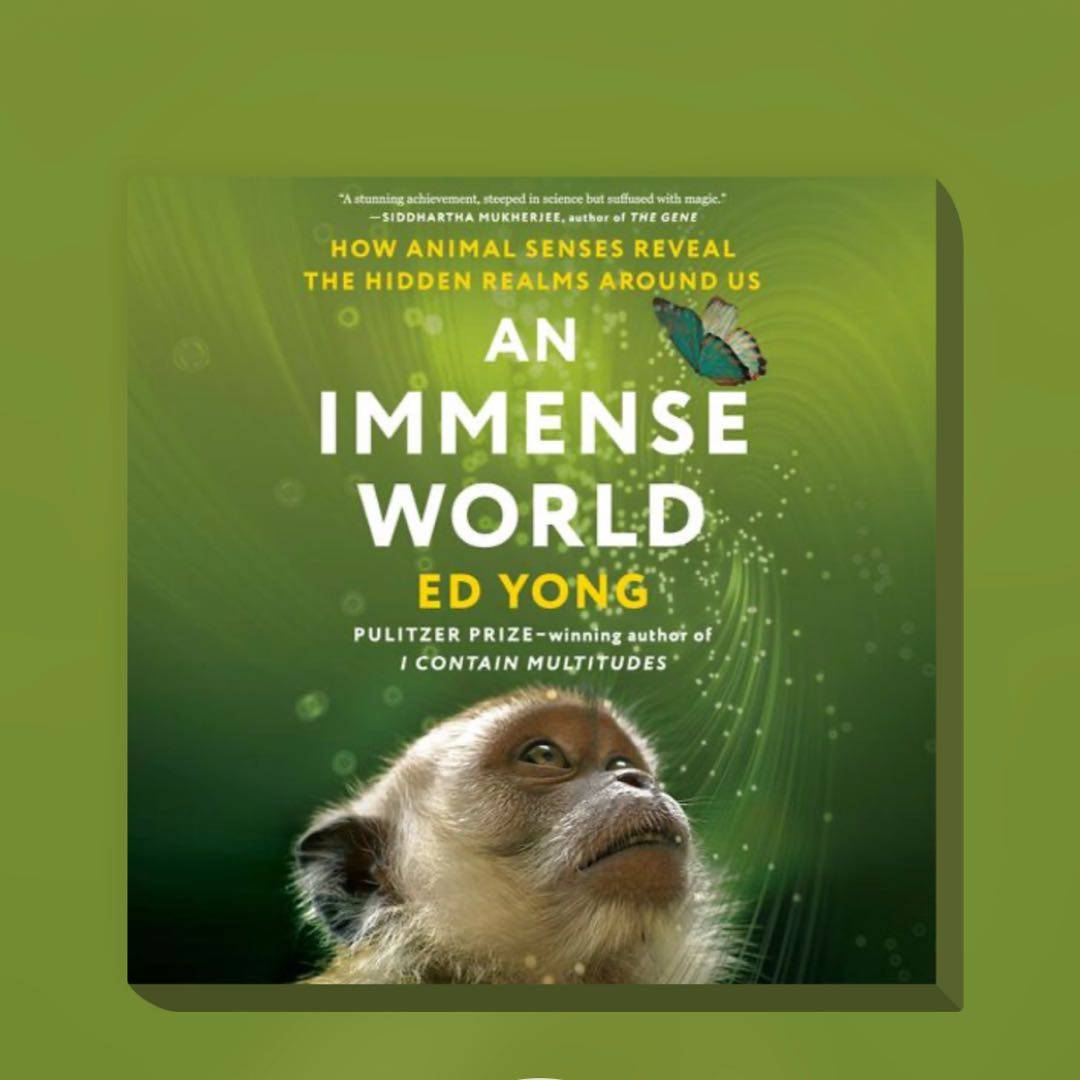
There‘s been a lot of love for this book so I‘m in the minority for this one. There were definitely interesting parts, but some parts were a bore. It‘s well researched, an interesting overall book but too long for me. I am looking forward to discussing it at book club and I‘m pretty sure I know the readers of the group who will have enjoyed the book and those who DNF 😂
On the difficulties of providing numbers for comparing humans‘ and dogs‘ olfactory systems: “It is easy to find estimates, and vey hard to find primary sources for them; after an hours-long search that included a university paper that sourced a factoid to a book in the For Dummies series, I fell into an existential void and questioned the very nature of knowledge.” 🤣

Chapter One: Leaking Sacks of Chemicals
“I don't think he's been in here before, “ Alexandra Horowitz tells me, “So it should be very smelly.“
#FirstLineFridays
@ShyBookOwl
#WeekendReading
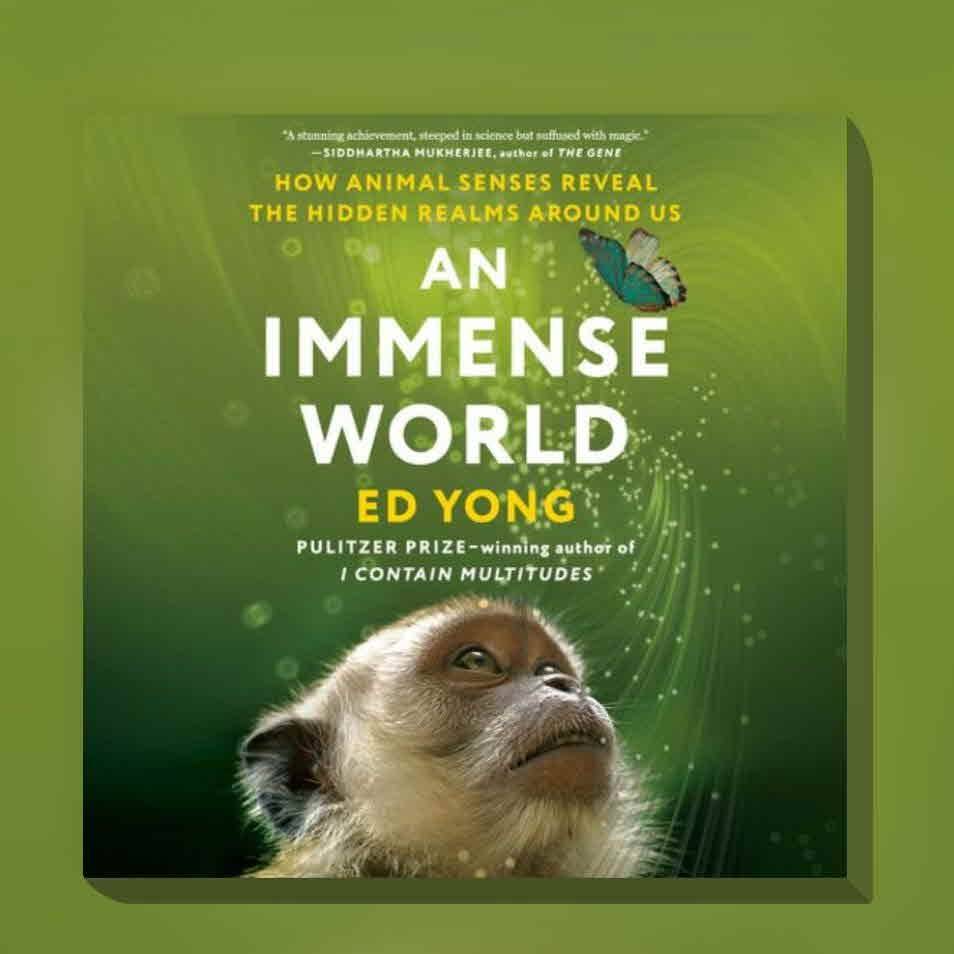
This was fantastic! I cannot recommend it strongly enough. I learned so much, and I'd like to get a physical copy now to read because there's so much fascinating information. The final chapter alone should be required reading. #highlyrecommend #mustread
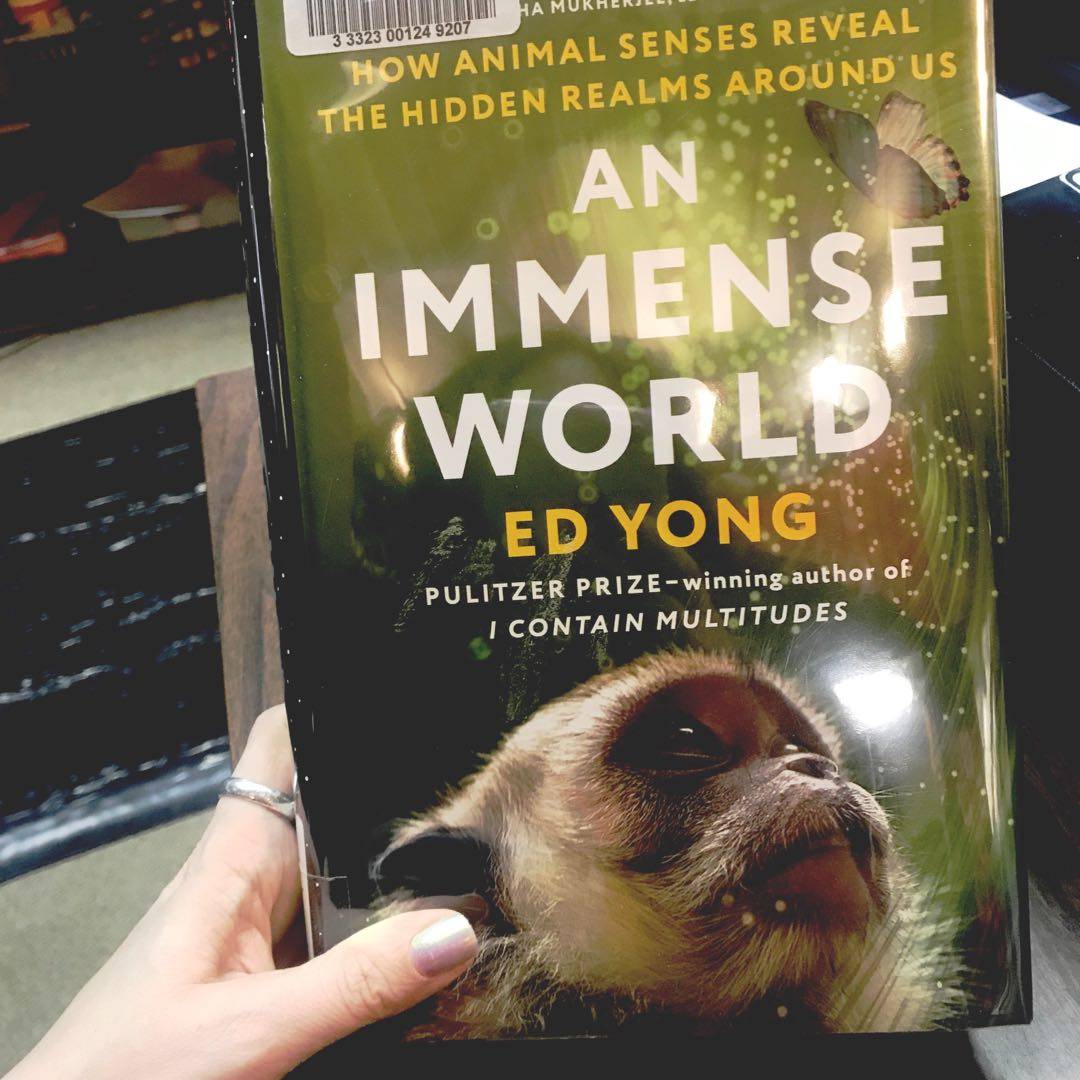
A patron recommended this to me - I don‘t think I have the attention span, even though it‘s really kind of cool. This is probably going to be a “read a chapter, then read something else, then read another chapter” kind of thing for me. #animmenseworld #edyong #animals #biology #science
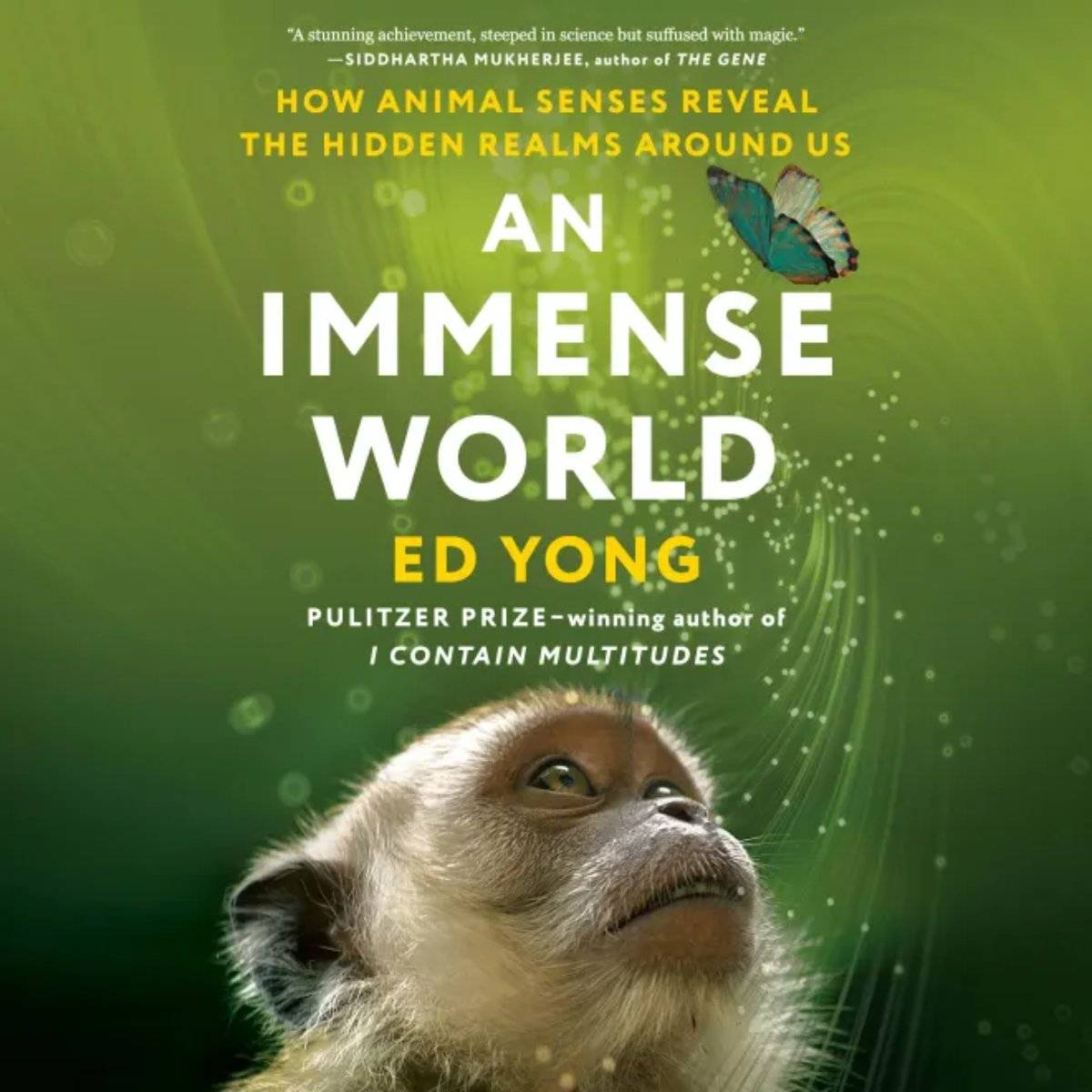
Such a fantastic book! Been meaning to get to it since well before it came out bc I love Ed Yong (his previous book I Contain Multitudes, plus his Atlantic writing in general and his pandemic pieces in particular). Endless cool facts about how animals sense the world (as best we can tell!). And a wonderful reminder that humans' perceptions of the world are limited by our own senses and perspectives...but learning can expand both of these. 💚
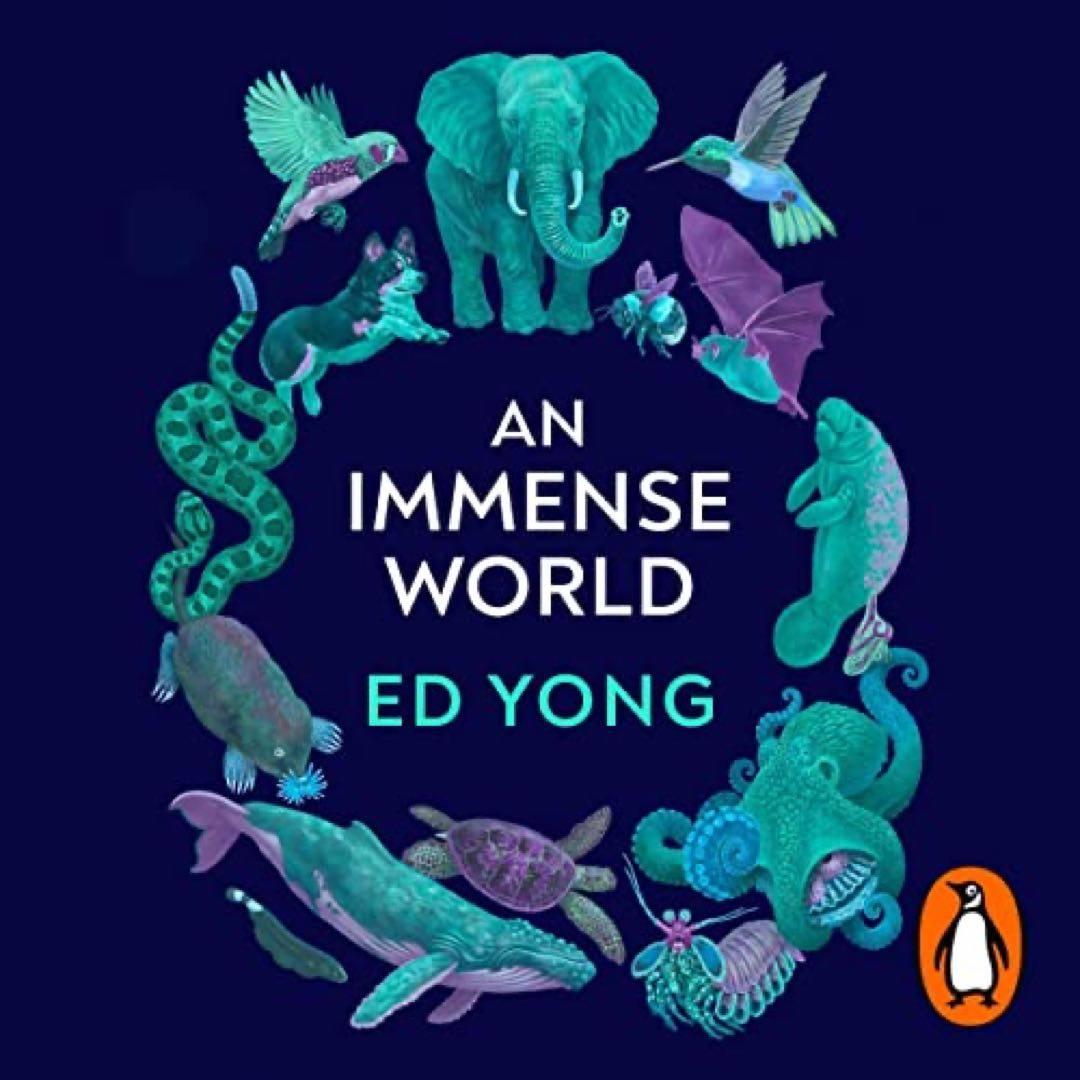
3-9 Feb 22 (audiobook)
Thought-provoking book about ‘umwelt‘ how the world of each living creature is shaped by their differing senses and capabilities. Fascinating to consider how different creatures experience the world, although as the author concedes it is quite impossible for humans to really step out of their umwelt.
My return to a pescatarian diet was short-lived. There is always an element with these books of preaching to the converted.
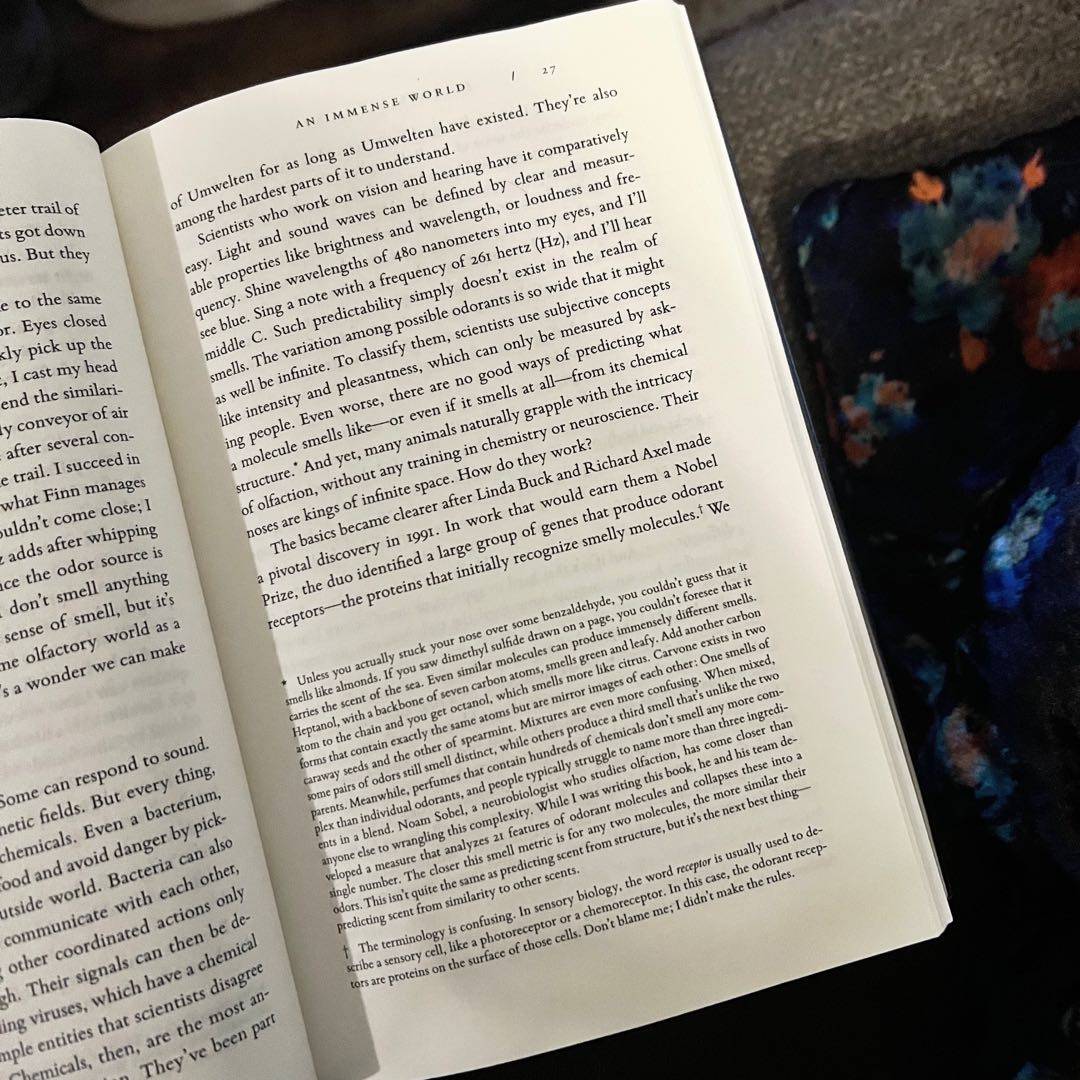
Check out this footnote to text ratio
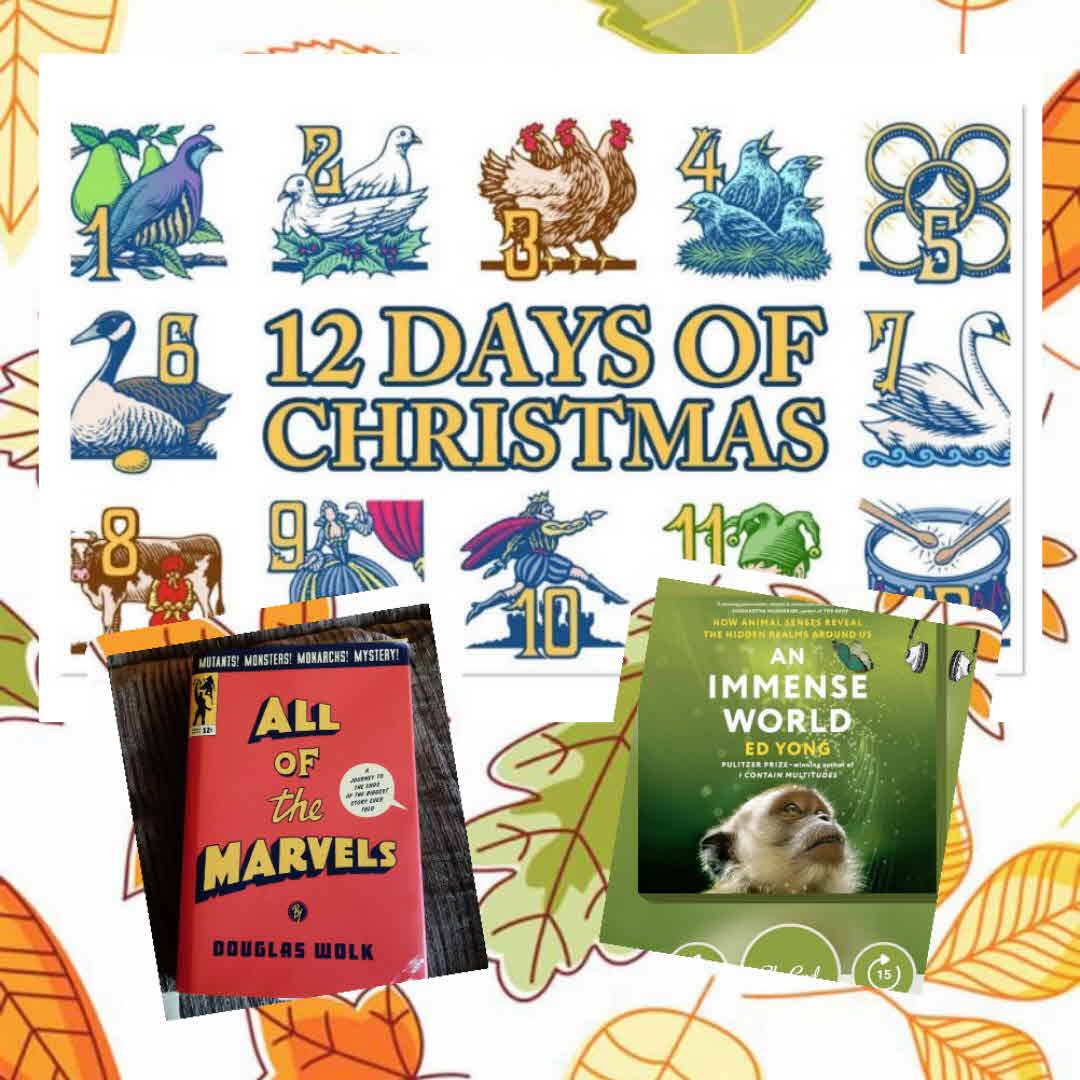
Playing catch up since I forgot to post yesterday. For August, it's definitely Ed Yong's amazing book An Immense World. I recommend it to everyone who's interested in nature, animals or ecology. September choice is Douglas Wolk's All The Marvels. It is a detail dissection of the story Marvel Comics has been producing since the 1960s. The mere idea of reading every Marvel Comic ever published boggles the mind.
#12Booksof2022 @Andrew65
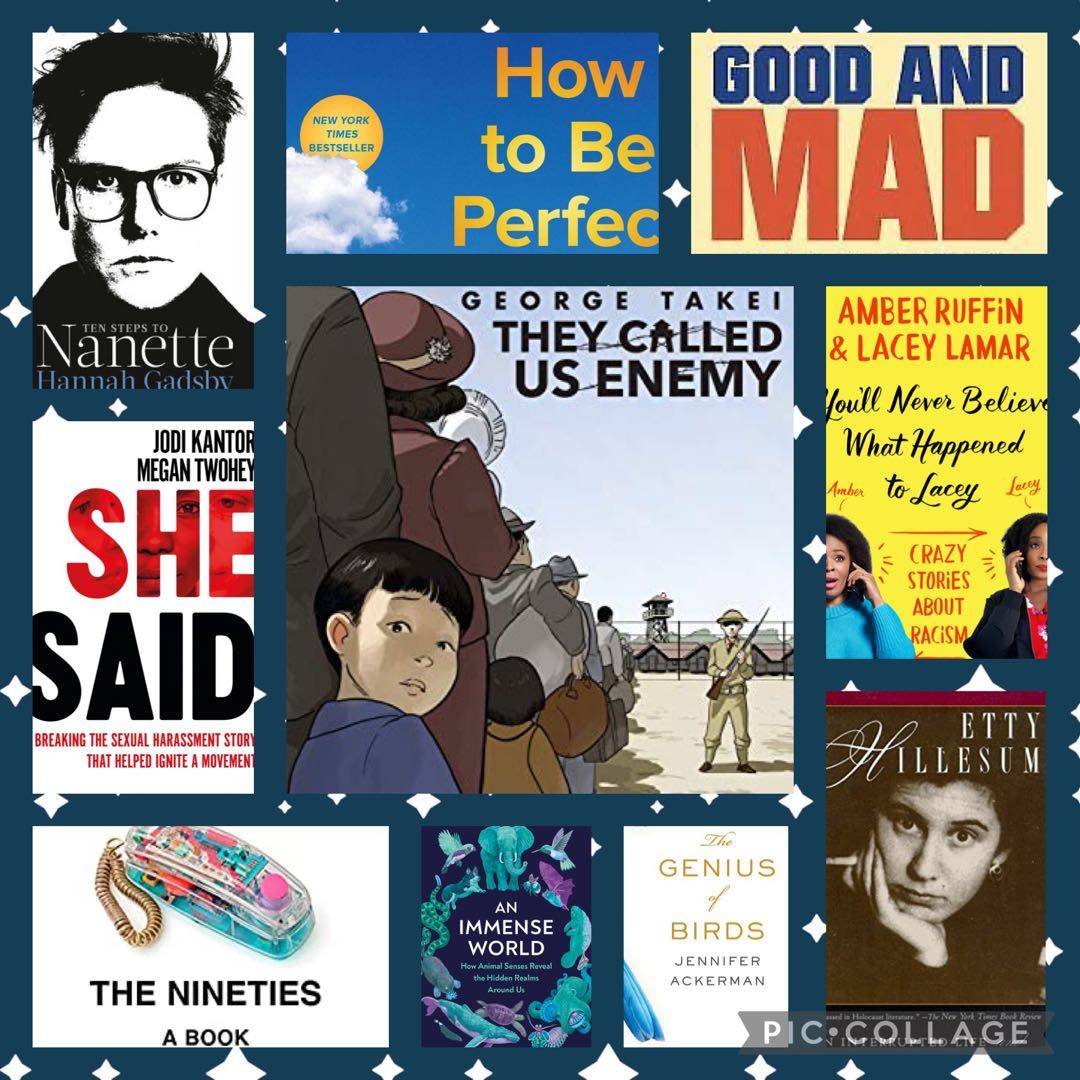
Another year of great reads in the books! Here are my top ten nonfiction reads of this year. I wasn‘t able to get my nonfiction/fiction ratio exactly 50/50 like I wanted (it ended up being 47% nonfic which isn‘t too shabby) - but I‘ll work on that next year for sure. 😄
Will also try to read more broadly in topic/type of nonfiction in 2023 (as there tends to be some themes in my current nonfic selections).
If you‘ve got any recs send my way!